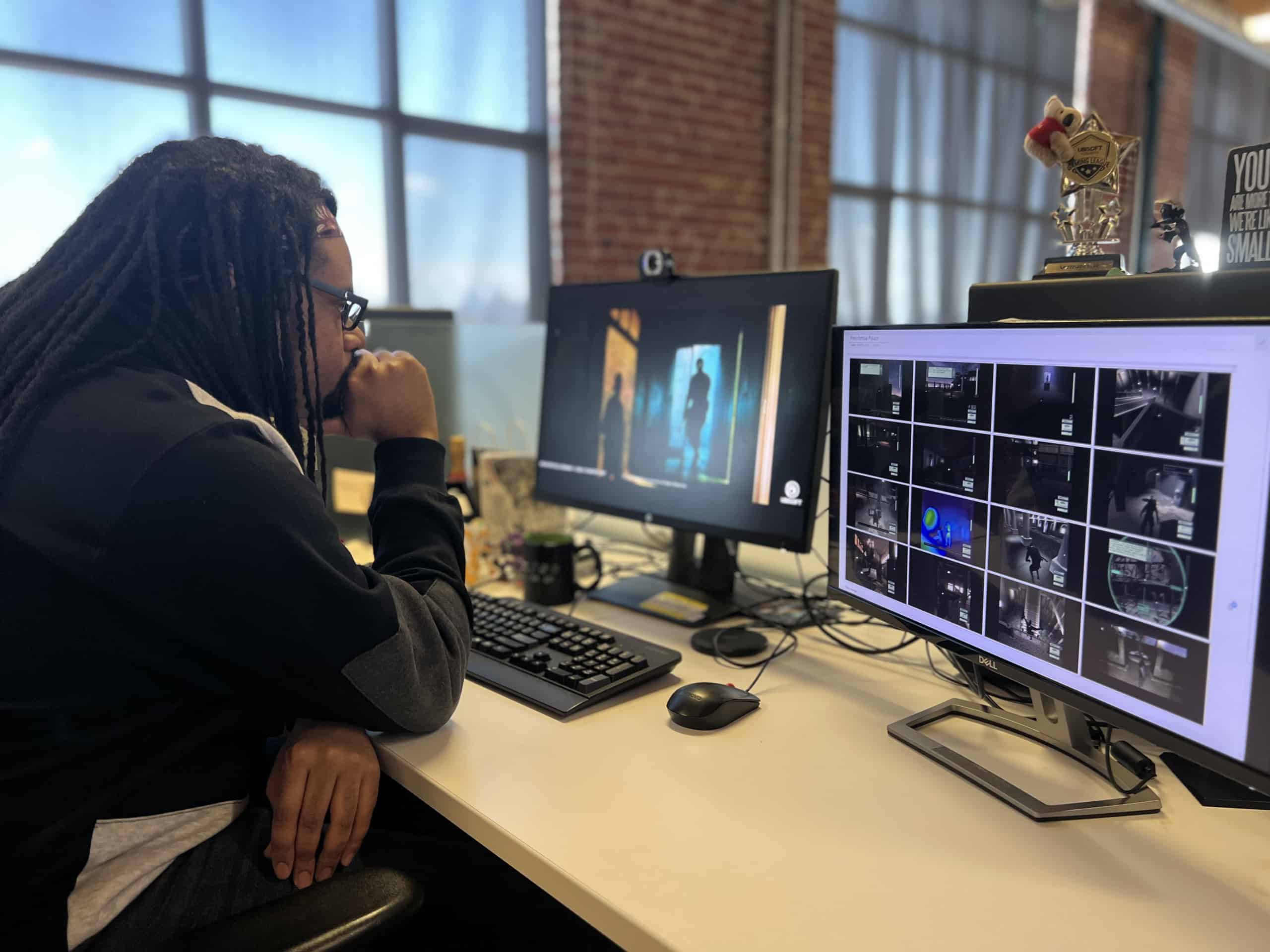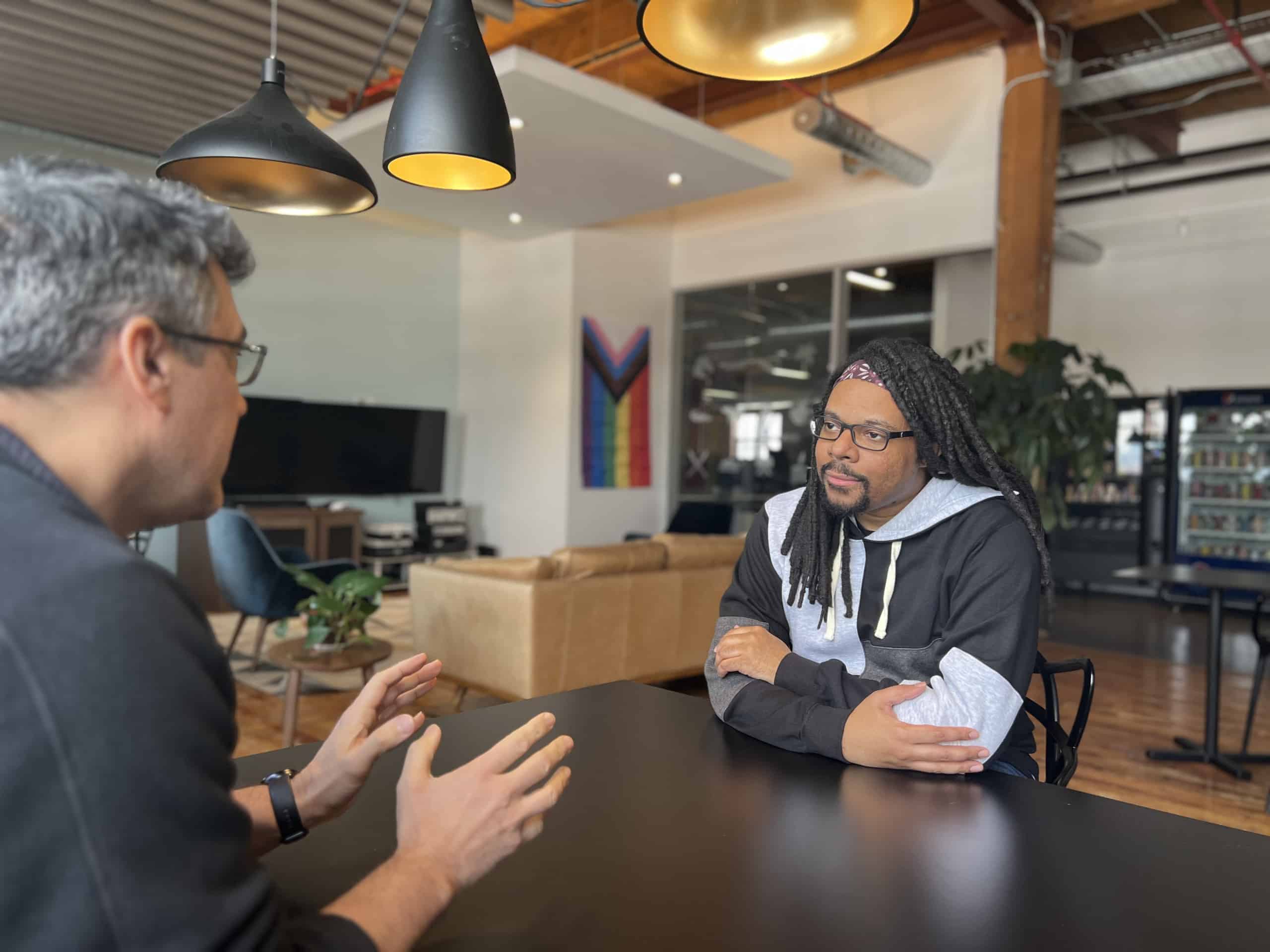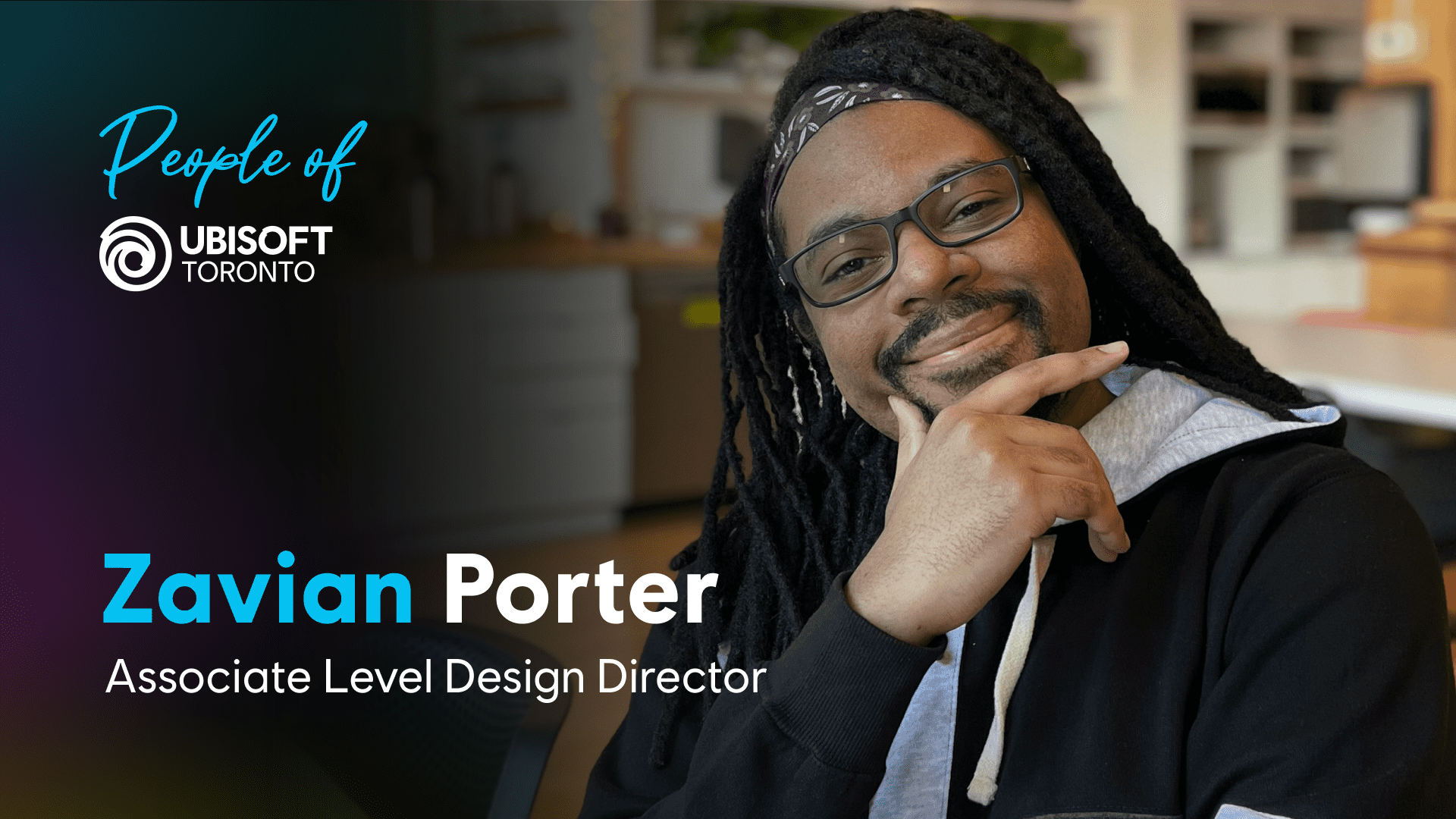He cut his teeth as a systems designer where he gained an appreciation for progression systems, user research and a solid foundation in tools and design principles. Today, Zavian is a 15-year veteran in his field and shares his expertise with his team as Associate Level Design Director on the Splinter Cell remake. Learn how he empowers his team to do their best work and his advice to becoming an expert in your discipline.
Hey Zavian! What do you do as an Associate Level Design Director and how long have you been with Ubisoft Toronto?
I’ve been at Ubisoft Toronto for 5 years now. This is also the total amount of time I’ve been in Canada itself. But sheesh, it sure doesn’t feel like it, considering the pandemic. I only started in the director role about 5 months ago, but I’m already having a fun time with it!
My primary goal is to nail down and provide a high-level vision of how our missions should flow. I provide this in a digestible form and talk to our team members to ensure we’re on the same page. As new data emerges, I then check if the high-level vision needs to be altered or if we need to change course in our implementation. But that leads to my favorite part of being a director: empowering people, watching over their process, and providing feedback. I’m not here to tell people how to do their jobs; I’m here to keep all details of the game in my mind and communicate it to our team so they can best do their jobs.

You’re currently working on the Splinter Cell remake. Tell us a little more about what you do?
My focus on Splinter Cell is on the missions themselves. Being a remake, that means maintaining an intimate knowledge of missions, objectives, and challenges presented throughout the entire Splinter Cell franchise. We’re going back to the roots of Splinter Cell: a focus on our signature stealth. Therefore, I need to evaluate what worked and what didn’t throughout the entire franchise, especially the original Splinter Cell trilogy. I then parse it into a “vision” that the team can use as a guide. This can take the form of presentations, in-engine examples, or even walk-through videos of myself playing the Splinter Cell games (particularly the original trilogy) or games made by other developers. It might sound a bit loose, but that’s part of the beauty of it.
I make myself a resource that everyone else on the team can come to for information and feedback. I keep track of nearly everything related to our missions so that others can focus on their individual areas, trusting me to call them out if anything goes awry. For me, direction isn’t plotting everything out and getting the team to build it. Instead, it’s giving our experts a job to do, ensuring they have everything they need to do their jobs well, and keeping a high-level view of it to ensure it snaps together amazingly.
Want to learn more about what’s in store for the Splinter Cell franchise? Check out our 20th anniversary roundtable discussion here.
CAREER DEVELOPMENT
What did you do before working at Ubisoft Toronto? How did you break into the video game industry?
Before coming to Ubisoft Toronto, I worked at Deep Silver Volition on the Saints Row series and Agents of Mayhem. It was about 15 years ago that I joined Volition as a Quality Assurance Tester testing Saints Row 2 PC. I became a Systems Designer on Saints Row IV and worked on the Super Power activities as well as a mission in the game. While creating my first mission, I came to appreciate Volition’s focus on fun first, creating over the top climaxes, and utilizing playtest data.

You’ve worked on Watch Dogs Legion. Can you tell us about a key task/strategy that you’ve worked on for a project and how you approached it?
I was the Level Design Team Lead for the Watch Dogs Legion: Bloodline DLC. That DLC was all about bringing back franchise characters and mixing them up in interesting ways utilizing Legion’s London as a backdrop. The big pieces I pushed for as a Lead were to make sure that we utilize what makes Aiden and Wrench unique as characters. This meant taking what our Game Design team was already building for the characters and ensuring our missions utilized their gameplay kits well. Outside of just gameplay, I also wanted to ensure that the stories of Aiden and Wrench were given adequate time to shine. This meant working closely with our fantastic writers to make sure our missions were giving their writing room to breathe. It wasn’t enough to just bring these characters back as gameplay tools. We knew players would appreciate seeing Aiden and Wrench play off other characters in the world.
What’s your favourite project that you’ve worked on?
After all this time, Saints Row IV remains my favorite project that I’ve worked on. I count myself lucky for having my design career begin with a game so focused purely on fun, and the player experience, while being a love letter to our fans. It was nowhere near my best work, but I learned so much from that project. I still apply the principles I’ve learned at Volition to this day: the importance of putting yourself into your audience’s heads, looking at content with fresh eyes, and understanding that what you’re working on doesn’t exist in a vacuum.
What are some tips you’d give to someone hoping to land a similar role to yours?
While I don’t think people should “aim” to be a director, there are goals that you can work towards.
Aim to have an expert understanding of your discipline and be able to pass on that knowledge to others. Aim to make good games, which means understanding why people play your games. Aim to be a great team player, which means being an asset to your team and understanding each discipline’s needs and desires. You don’t become a director overnight but in accomplishing each of these things, you become a very valuable expert and set you and your team’s projects up for success.
For me, this started with being a System Designer and appreciating progression systems. Once I became a Mission Designer, I applied this understanding of progression systems to my missions and my teams by focusing on the “context” of the mission. That means knowing what comes before and after my missions, thus keeping the pace of the entire game in mind. Working closely with the User Research team helped guide me as well as pass on information to the rest of the team. All of this while growing my expertise with the tools and design principles.

LIFE AT UBISOFT TORONTO
What surprised you most when you joined Ubisoft Toronto?
Honestly, it was the diversity of the studio. This speaks quite a bit to the diversity of Toronto itself. As I understand it, nearly half of Toronto’s population is made up of immigrants. This is a stark difference from Illinois, where I grew up. It was somewhat of a culture shock at first, but the diversity of people also meant learning from and working with a wide range of ideas and perspectives.
What are Ubisoft Toronto’s strengths and what can we work on? What has changed for the better recently?
Ubisoft’s biggest strength is that this place really is like a machine. A lot can get done exceptionally fast, which can be a bit overwhelming. This quickly leads to what the company needs to continue to work on when it comes to our productions: giving designs room for iteration. You have to be extremely lucky to “get it right” the first time. Outside of production, I have seen promising changes towards making safer working environments.
PERSONAL
What are some games that inspire the work you produce?
I’m a big fan of “immersive sims”, a genre in which the player is placed into a wide environment with a far-off goal and a ton of tools to play with the game’s systems to achieve that goal. The big ones for me were Deus Ex and System Shock 2. I loved their encouragement of player agency to discover paths, as well as the overlapping player tools and gameplay systems that reward clever solutions. Lately, Arkane Studios has continued to put out some great takes on the genre, with the Dishonored series, Prey, and most recently, Deathloop. I’m highly looking forward to Gloomwood as well. The immersive sim genre historically struggles, but I’m always interested in trying to allow players to have creative solutions to problems.
What’s one game that’s left a lasting impact on you?
This will probably seem out of left field for what I’ve worked on and where I’m at, but the game that’s had the biggest lasting impact on me is Xenogears for PS1. It’s a JRPG that I was enamored with in high school. Extremely cool world building, awesome music, high melodrama, a little philosophy, and cool giant robots are the essence of Xenogears. The themes were relatively mature, and the plot was well paced and engaging (outside of a very slow sewer section). But having played plenty of other JRPGs by that time, I was particularly amazed at how it mixed 2D and 3D to do cinematic storytelling. Where others were excited by Metal Gear Solid bringing movie-style cinematics to games, I was highly impressed with how Xenogears was doing so much with so little. Even though the game got rocky near the end, it was such an impressive design built with clearly a ton of limitations in place.
———
People of Ubisoft Toronto is a series featuring studio members from a variety of projects and backgrounds as they share their experiences at our studio, perspective of the video game industry and, perhaps, even a sneak peek of what they’re working on! 
Our studio values diversity and believes in embracing differences to build stronger and more creative teams. We welcome people who would like to join us and redefine the future of games. Visit our careers page for more information on open roles and how to apply. To know more about our studio members and culture, click here.
